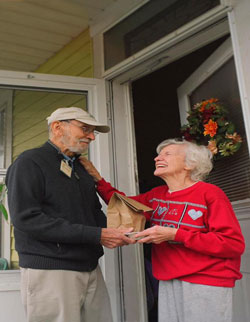
Proper, affordable nutrition is a necessity. For a senior living alone, getting it can be a challenge. Those elders with reduced mobility, who can no longer drive to the grocery, or on low fixed incomes are especially vulnerable to malnutrition.
As a result, volunteer Meals on Wheels programs have sprouted up nationwide to help keep homebound seniors from going hungry. The first US-based Meals on Wheels service opened in Philadelphia in 1954. By the early 70s, the Older Americans Act was providing federal funding for safety net senior nutrition services, including Meals on Wheels efforts.
The Meals on Wheels Association of America estimates that there are currently over 5,000 local programs in the United States, providing more than 1 million meals daily to people in need. Volunteers are said to number between 800,000 to 1.7 million individuals nationwide — a considerable network.
Several Meals on Wheels organizations serve the Greater Cincinnati area, and at Deupree House, we're helping serve the seniors living on the east side of the city.
Deupree Meals on Wheels is a vital, volunteer-based community program.
Located in Cincinnati’s Hyde Park neighborhood, the Deupree Meals on Wheels program was founded in 1989 in partnership with the Council on Aging of Southwest Ohio to “supplement family support by providing older adults with a meal and social contact.”
Volunteers prepare and deliver meals Tuesday through Friday, at lunchtime, to almost 500 recipients. Frozen meals are provided to some clients to meet weekend needs, and non-perishable meals are available for long-term storage for emergency use.
Every year, the program delivers over 100,000 meals to seniors in need. The meals cost $7 each, but some seniors qualify for subsidies based on financial means.’
The program is open to anybody regardless of age, income, or circumstance, who can pay for his or her meal. But to qualify for subsidized meals through the Council on Aging, recipients must be at least 60 years old and demonstrate need based on screening criteria.
Each meal is nutritionally balanced with an entrée, a vegetable, a salad, a starch and a nutritious beverage (milk or juice). Meals are delivered hot, and recipients do have the opportunity to choose their entrées and beverages. Low-fat, low-sodium and other special dietary needs are provided for on an individually customized basis.
Delivery schedules can be modified based on client needs. A senior who must go to a doctor’s appointment during a normal delivery time, for example, need not go hungry for the day. A volunteer will be more than happy to deliver late in the day, after work.
Meals on Wheels helps retirees stay involved by helping their peers.
Many of the Deupree Meals on Wheels volunteers are themselves retirees. And the program gives them a way to stay involved in a meaningful capacity.
Steve Peelman, a retired mailman, learned about the opportunity in an announcement in his church’s bulletin one Sunday. Delivering meals seemed to be a perfect fit, given his former career, and allowed him to build ties with neighbors who in many cases were not much older than himself.
The social engagement the program provides is in some ways as valuable to recipients as the food. Delivery visits by volunteer drivers are a regular source of contact with the outside world; many of the drivers develop strong bonds with their clients.
Former teacher Anne Greenwald, who delivers meals to residents of the Cambridge Arms apartment complex, sees just how much her clients appreciate the moments she spends with them at delivery time. Many of them are happy just to have someone to talk to, and she loves listening to the stories her clients tell her in the few minutes she gets with each of them.
The delivery contact can even serve as a secondary safety check.
If a volunteer receives no answer at the door, the Meals on Wheels program will contact and follow up with the client’s designated emergency contacts, or with emergency responders.












